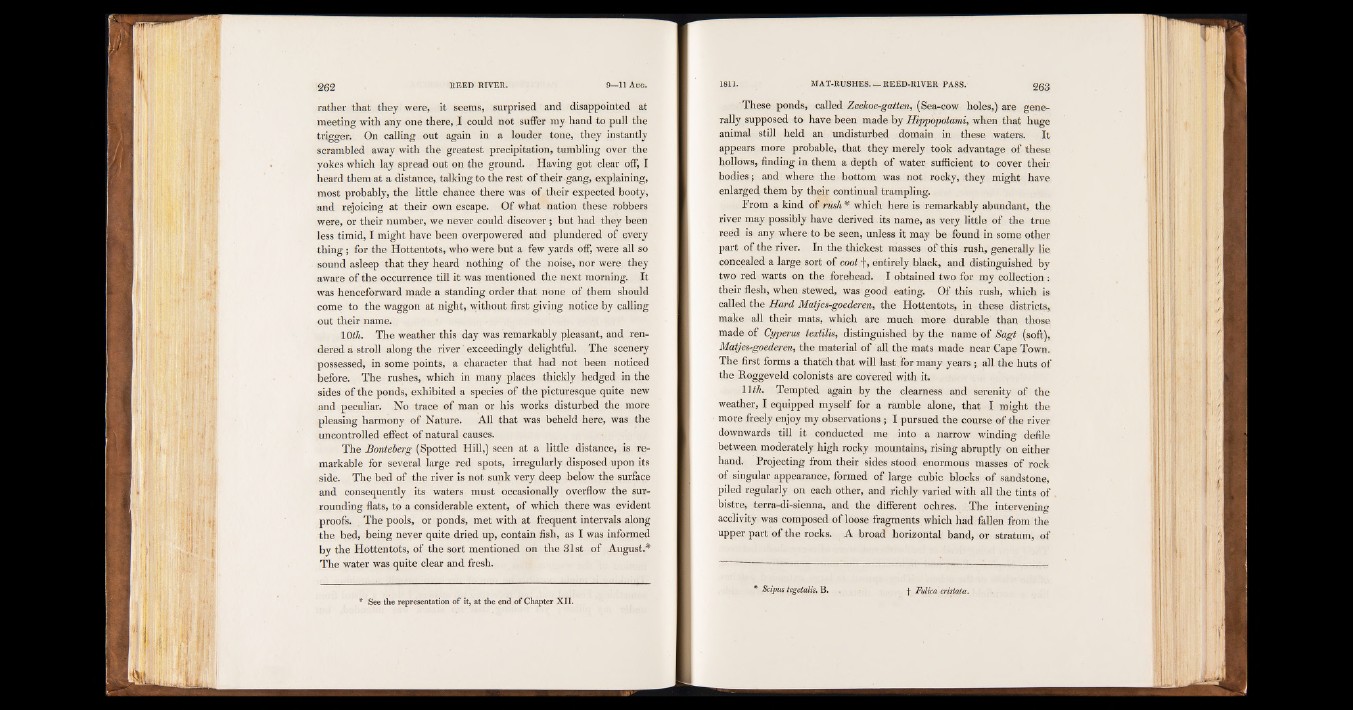
rather that they were, it seems, surprised and disappointed at
meeting with any one there, I could not suffer my hand to pull the
trigger. On calling out again in a louder tone, they instantly
scrambled away with the greatest precipitation, tumbling over the
yokes which lay spread out on the ground. Having got clear off, I
heard them at a distance, talking to the rest of their gang, explaining,
most probably, the little chance there was of their expected booty,
and rejoicing at their own escape. Of what nation these robbers
were, or their number, we never could discover ; but had they been
less timid, I might have been overpowered and plundered of every
thing; for the Hottentots, who were but a few yards off, were all so
sound asleep that they heard nothing of the noise, nor were they
aware of the occurrence till it was mentioned the next morning. It
was henceforward made a standing order that none of them should
come to the waggon at night, without first giving notice by calling
out their name.
1<M. The weather this day was remarkably pleasant, and rendered
a stroll along the river' exceedingly delightful. The scenery
possessed, in-some points, a character that had not been noticed
before. The rushes, which in many places thickly hedged in the
sides of the ponds, exhibited a species of the picturesque quite new
and peculiar. No trace of man or his works disturbed the more
pleasing harmony of Nature. All that was beheld here, was the
uncontrolled effect of natural causes.
The Bonteberg (Spotted Hill,) seen at a little distance, is remarkable
for several large red spots, irregularly disposed upon its
side. The bed of the river is not sunk very deep below the surface
and consequently its waters must occasionally overflow the surrounding
flats, to a considerable extent, of which there was evident
proofs. The pools, or ponds, met with at frequent intervals along
the bed, being never quite dried up, contain fish, as I was informed
by the Hottentots, of the sort mentioned on the 31st of August.*
The water was quite clear and fresh.
* See the representation of it, at the end of Chapter XII.
These ponds, called Zeekoe-gatten, (Sea-cow holes,) are gene-
rally supposed to have been made by Hippopotami, when that huge
animal still held an undisturbed domain in these waters. It
appears more probable, that they merely took advantage of these
hollows, finding in them a depth of water sufficient to cover their
bodies; and where the bottom was not rocky, they might have
enlarged them by their continual trampling.
From a kind of rush* which here is remarkably abundant, the
river may possibly have derived its name, as very little of the true
reed is any where to be seen, unless it may be found in some other
part of the river. In the thickest masses of this rush, generally lie
concealed a large sort of coot f , entirely black, and distinguished by
two red warts on the forehead. I obtained two for my collection :
their flesh, when stewed, was good eating. Of this rush, which is
called the Hard Matjes-goederen, the Hottentots, in these districts,
make all their mats, which are much more durable than those
made of Cyperus textilis, distinguished by the name of Sagt (soft),
Matjes-goederen, the material of all the mats made near Cape Town.
The first forms a thatch that will last for many years j all the huts of
the Roggeveld colonists are coVered with it.
I \th. Tempted again by the clearness and serenity of the
weather, I equipped myself for a ramble alone, that I might the
more freely enjoy my observations ; I pursued the course of the river
downwards till it conducted me into a narrow winding defile
between moderately high rocky mountains, rising abruptly on either
hand. Projecting from their sides stood enormous masses of rock
of singular appearance, formed of large cubic blocks of sandstone,
piled regularly on each other, and richly varied with all the tints of
bistre, terra-di-sienna, and the different ochres. The intervening
acclivity was composed of loose fragments which had fallen from the
upper part of the rocks. A broad horizontal band, or stratum, of
* Scipus tegetalis. B. j- Fulica cristata.